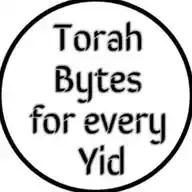
Torah Bytes for every Yid Channel
June 1, 2025 at 04:32 AM
*Make Matan Torah Great Again*
The Rambam says it's a mitzvah to elevate the topic of Matan Torah.
> About Matan Torah the Rambam in his Iggeres Taiman says, גדלהו על כל גדולה – Make this the most important of all great things to speak about. You have to speak about Matan Torah. Speak to your wife about Matan Torah. She should speak to the children about Matan Torah. Get excited about it. Make that bigger than the biggest things. -- R' Avigdor Miller
*Ramban on the Order of the Events at Matan Torah based on Shemos 20:15*
In order to appreciate Shavuos even more, we are encouraged to relive the events that led up to Matan Torah.
The order of events [on the day of the Matan Torah] was as follows:
In the morning, there were thunderings and lightnings and the loud voice of the shofar, but the Shechinah had not yet descended on the mountain, something like it is written, "And a great and strong wind rent the mountains, and broke in pieces the rocks before Hashem; but Hashem was not in the wind. "
And the people who were in the camp — i.e., in their place of encampment — trembled. But Moshe encouraged them and brought them forth towards Hashem… and they stood at the nether part of the mount (Shemos 19:17). While they were standing there at the nether part of the mount in anticipation, Hashem descended upon the mount in fire and the smoke thereof ascended unto the heart of heaven, with darkness (חשך), cloud (ענך), and thick darkness (ערפל).
The mountain itself trembled and quivered as mountains do in an earthquake called zalzalah (זלזלה), or even more than that. And so it is written, "The mountains danced like rams, the hills like young sheep" (Tehilim 114:6) This is not a figure of speech, just as the preceding verse — "The sea saw it, and fled; the Jordan turned backwards" — is not a mere figure of speech.
Meanwhile, the voice of the shofar waxed louder and louder (Shemos 19:19). Then the people saw what was happening, and they moved backwards and stood further away from the boundary [that Moshe had set for them]. They all said to Moshe that Hashem should not speak with them at all lest they die, for by reason of the vision, their pains came upon them and they retained no strength, and if they would hear the Divine utterance, they would die.
Moshe, however, encouraged them, and he said to them, Fear not (Shemos 20:16). And they heard him, and the people stood from afar off (Shemos 20:17) at their positions, for in spite of all his words, they did not want to come near the boundary [he had set for them].
And Moshe drew near unto the thick darkness (Shemos 20:17) but did not come into it, and then Hashem uttered the Aseres HaDibros (the Ten Commandments).
Now following the Aseres HaDibros, The Torah did not mention here what the elders said to Moshe, for it wanted to explain the commandments and the ordinances in succession. But in the Book of Devorim, Moshe mentioned that after the Aseres HaDibros [were given], all the heads of the tribes and their elders approached him and said to him, "If we hear the Voice of Hashem our G-d any more, then we shall die, for we have estimated our powers [and found] that we could not stand any more the burden of the word of Hashem Elokim." They had thought that Hashem wanted to relate to them all the commandments [of the Torah], and therefore they said, "You go, and hear all that Hashem our G-d may say; and you shall speak to us all that Hashem our G-d may speak to you; and we will hear it, and do it." (Devorim 5:22) And Hakadosh Boruch Hu, agreed to their words, and He said, "They have spoken well," for such was His desire to proclaim to them only the Aseres HaDibros, and their fear appeared correct to Him.
-- Based on a remix of old and contemporary English translation (not AI-generated).
https://app.simplenote.com/publish/2rxyt7